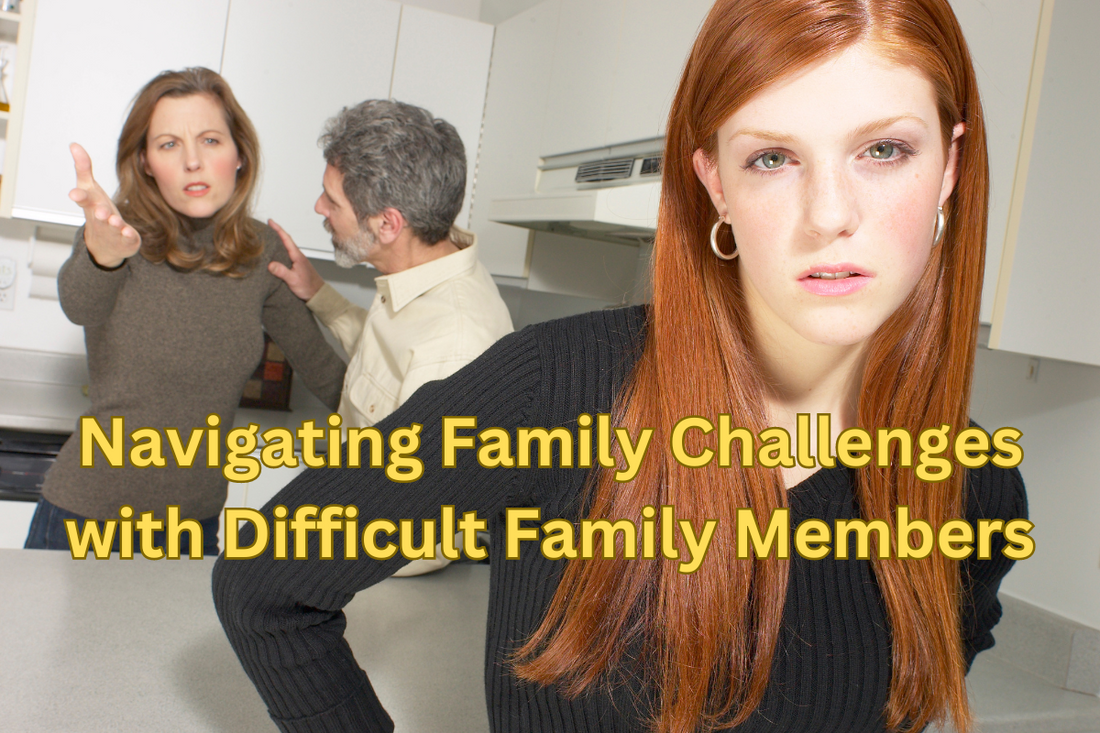
Navigating Family Challenges with Difficult Family Members: A Guide to Courage, Authenticity, and Empathy
Share
Family relationships can be some of the most rewarding, but they can also be incredibly challenging especially when navigating dynamics with difficult family members. Whether it’s unresolved issues, clashing personalities, or long-standing patterns of conflict, dealing with family challenges can be emotionally exhausting. However, by approaching these situations with courage, authenticity, and empathy, we can create space for healing and growth, even in the toughest relationships.
-
Embracing Courage in Family Conflict:
Courage in the context of family relationships is about more than confronting difficult conversations. It’s about staying true to who you are, even when others may expect you to fit into old roles or patterns.
- Set Clear Boundaries: Family can push your buttons like no one else. But setting and maintaining clear boundaries is key to protecting your peace. It takes courage to say ‘no’ or to ask for space when needed, but doing so is an act of self-respect.
- Stay True to Yourself: Family dynamics can sometimes pressure you to conform or compromise who you are. Courage means standing firm in your values and not letting guilt or obligation sway you from your truth.
- Have the Difficult Conversations: Addressing long-standing issues head-on can be daunting but avoiding them only prolongs the tension. Courageous conversations allow for healing, even if they are uncomfortable at first.
-
Authenticity in Family Relationships:
One of the most powerful ways to navigate challenging family dynamics is by staying authentic. When you remain true to who you are and communicate from a place of honesty, it encourages healthier interactions and stronger relationships.
- Be Real About Your Needs: Authenticity means acknowledging what you need from family relationships and being clear about those needs. Whether it’s more space, support, or understanding, communicate openly rather than suppressing your feelings.
- Lead with Integrity: When you lead with authenticity, you set a standard for the relationship. You show that honesty and transparency are more important than simply keeping the peace. This can shift the family dynamic toward deeper, more meaningful connections.
- Stay Grounded in Your Identity: Family relationships can sometimes pull you back into old roles or versions of yourself. Staying authentic means holding on to the person you’ve grown into, even when family expectations try to steer you otherwise.
-
Practicing Empathy with Difficult Family Members:
Family relationships can often carry emotional baggage from the past, making it easy to fall into patterns of frustration or resentment. However, empathy can help soften these dynamics and open the door to deeper understanding.
- Seek to Understand Their Perspective: Difficult behavior often stems from unresolved pain, fear, or insecurity. While you don’t have to excuse bad behavior, practicing empathy can help you understand where it’s coming from and allow for more compassionate responses.
- Find Common Ground: Instead of focusing on the differences or conflict, look for areas of agreement or mutual concern. Empathy creates an opportunity to bridge the gap and start rebuilding trust.
- Maintain Emotional Boundaries: While empathy is important, it’s crucial to maintain emotional boundaries to protect your own well-being. You can understand someone’s pain without taking it on as your own or allowing it to impact your emotional health.
-
Choosing Love as the Ultimate Reality:
When dealing with family members, love doesn’t mean overlooking bad behavior or sacrificing your boundaries. It means choosing to approach the relationship with compassion and focusing on solutions, not conflict.
- Choose Compassion Over Resentment: When emotions run high, it’s easy to fall into cycles of anger or frustration. But choosing to lead with compassion, even when setting boundaries, helps prevent resentment from taking hold.
- Focus on Solutions, Not Problems: Family challenges can sometimes feel overwhelming, but love encourages us to focus on healing and finding ways forward, rather than getting stuck in the same arguments or frustrations.
- Allow Yourself to Grow: Love as the ultimate reality means allowing both yourself and your family members the space to grow. It means recognizing that healing and improvement are possible, even if the journey isn’t always smooth.
Conclusion:
Dealing with difficult family members can feel draining, but with courage, authenticity, and empathy, you can transform these relationships into opportunities for growth. Family challenges don’t have to define you. They can empower you to grow in love, compassion, and strength.
How do you navigate difficult family dynamics? Share your experiences or questions below. We’re all learning and growing together.
~ Crystallynne 🌟
